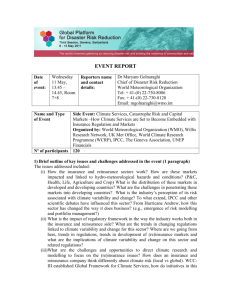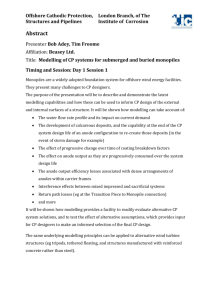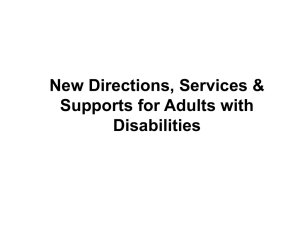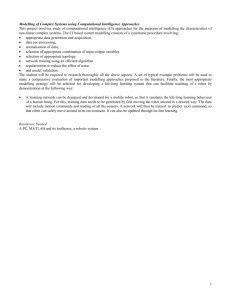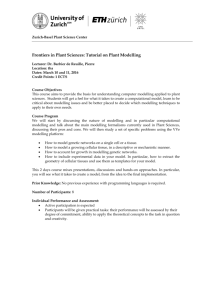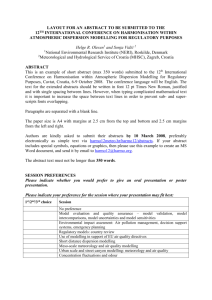Side event
advertisement
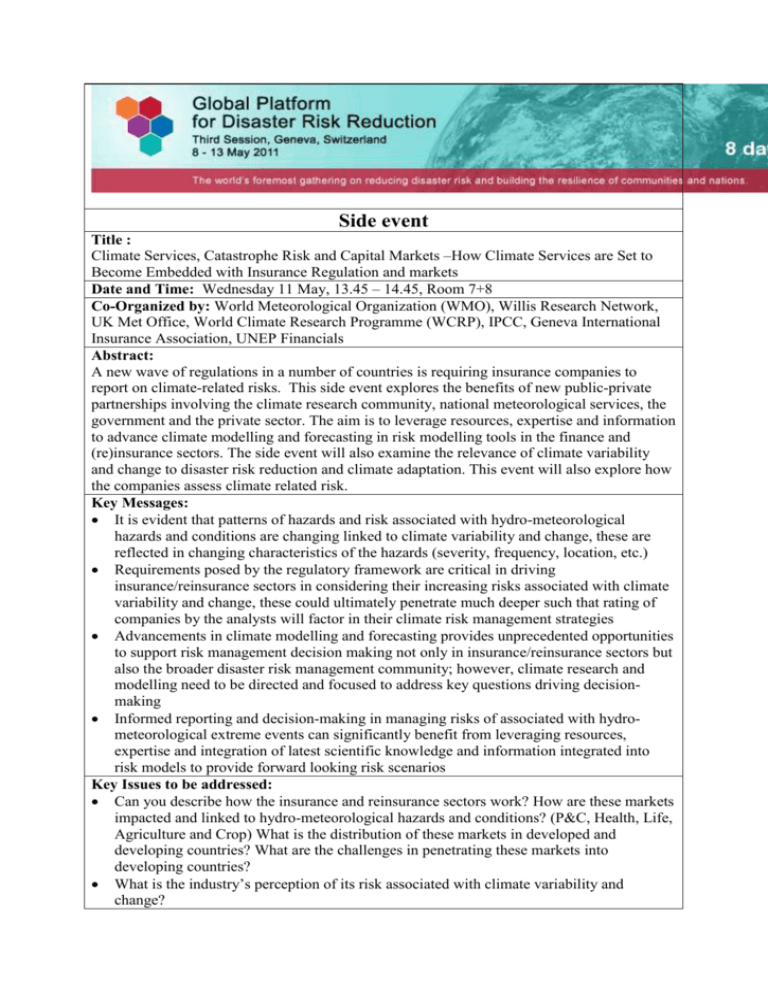
Side event Title : Climate Services, Catastrophe Risk and Capital Markets –How Climate Services are Set to Become Embedded with Insurance Regulation and markets Date and Time: Wednesday 11 May, 13.45 – 14.45, Room 7+8 Co-Organized by: World Meteorological Organization (WMO), Willis Research Network, UK Met Office, World Climate Research Programme (WCRP), IPCC, Geneva International Insurance Association, UNEP Financials Abstract: A new wave of regulations in a number of countries is requiring insurance companies to report on climate-related risks. This side event explores the benefits of new public-private partnerships involving the climate research community, national meteorological services, the government and the private sector. The aim is to leverage resources, expertise and information to advance climate modelling and forecasting in risk modelling tools in the finance and (re)insurance sectors. The side event will also examine the relevance of climate variability and change to disaster risk reduction and climate adaptation. This event will also explore how the companies assess climate related risk. Key Messages: It is evident that patterns of hazards and risk associated with hydro-meteorological hazards and conditions are changing linked to climate variability and change, these are reflected in changing characteristics of the hazards (severity, frequency, location, etc.) Requirements posed by the regulatory framework are critical in driving insurance/reinsurance sectors in considering their increasing risks associated with climate variability and change, these could ultimately penetrate much deeper such that rating of companies by the analysts will factor in their climate risk management strategies Advancements in climate modelling and forecasting provides unprecedented opportunities to support risk management decision making not only in insurance/reinsurance sectors but also the broader disaster risk management community; however, climate research and modelling need to be directed and focused to address key questions driving decisionmaking Informed reporting and decision-making in managing risks of associated with hydrometeorological extreme events can significantly benefit from leveraging resources, expertise and integration of latest scientific knowledge and information integrated into risk models to provide forward looking risk scenarios Key Issues to be addressed: Can you describe how the insurance and reinsurance sectors work? How are these markets impacted and linked to hydro-meteorological hazards and conditions? (P&C, Health, Life, Agriculture and Crop) What is the distribution of these markets in developed and developing countries? What are the challenges in penetrating these markets into developing countries? What is the industry’s perception of its risk associated with climate variability and change? To what extend, IPCC and other scientific debates have influenced this sector? From Hurricane Andrew, how this sector has changed the way it does business? (e.g., emergence of risk modelling and portfolio management?) What is the impact of regulatory framework in the way the industry works both in the insurance and reinsurance side? What are the trends in changing regulations linked to climate variability and change for this sector? What are the challenges and opportunities to direct climate research and modelling to focus on the (re)insurance issues? How does an insurance and reinsurance company think differently about climate risk (local vs global) Why it is important to integrate information climate research and modelling information into risk modelling? WCC-III established Global Framework for Climate Services, how do initiaves in this sector or supported by this sector in development of climate services can be scaled up to benefit the greater disaster risk management community? Where are we going from here, trends in regulations, trends in development of (re)insurance markets and how can climate services be developed to meet these demands? Can we also address the challenges in developing and least developed countries? Format: This will be an interactive side event. After introductions by the facilitator, each panellist will make a 5minute opening statements (with 1-2 slides maximum to demonstrate their point) focusing of 2-3 key questions from the list of key issues, followed by questions and comments, engaging the audience and the panellists. The Facilitator will ask each panellist for a one-minute concluding remark, message or recommendation. Facilitator: Mr. Walter Stahel, Vice-Secretary General and Director of Risk Management Research of The Geneva Association Panellists: Rowan Douglas, CEO Global Analytics, Willis Re and Chairman, Willis Research Network Policy expert (TBC) Speaker UNEP Financials (TBC) Matt Huddleston, UK Met Office Dr. Roger Pulwarty, Chief, Climate and Societal Interactions Division, Director of the National Integrated Drought Information System (NOAA, USA) Dr Maryam Golnarahi, Chief, WMO Disaster Risk reduction Programme
